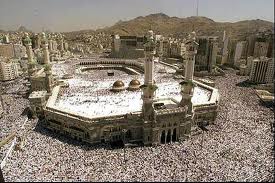
New Delhi/Lucknow, May 8: Majority of Muslim clerics and leaders Tuesday welcomed the Supreme Court ruling directing the government to eliminate in the next 10 years the subsidy given to Hajis - pilgrims to the holy Makkah.
The clerics and leaders said that instead of providing subsidies, the Haj committee, an autonomous body under the Indian government responsible for making arrangement for Haj pilgrimage, should be revamped.
The leaders demanded open tendering of tickets which would result in Air India, which at present has the ticketing monopoly, having to compete with other airlines to attract maximum travellers and giving cheaper tickets.
“We welcome this ruling. If people from other religions don’t get subsidies for pilgrimages, why should we. We all are equal citizens of the country,” Mukarram Ahmed, Shahi Imam of Delh’s Fatehpuri Masjid, told IANS.
Agreed Shahi Imam of Jama Masjid, Syed Ahmed Bukhari: “It should not take ten years for the ban on subsidy to come into effect but it should be done away with within a year.”
“The Haj committee should be made more powerful and better services, including cheap tickets, should be offered to those going on the pilgrimage,” Vice-Chancellor of Darul Uloom Deoband Mufti Abul Qasim Nomani told IANS.
“There should be open tendering of tickets so that there is competition and we get the best deal,” he added.
Bukhari slammed the present subsidy scheme and accused Air India of overcharging.
“Just because they have a monopoly, a Delhi to Jeddah ticket costs us Rs.45,000 whereas Saudi Arabian airlines’ ticket costs only Rs.22,000. Where is the money going? ... in the pockets of Air India,” said Bukhari.
Sunni community leader Haji Khalid Rasheed too said they were demanding for a long time that the subsidy by the union government be withdrawn.
"We have asked the government to axe the subsidy and to alternately follow it up with open tendering of air tickets… which would bring down the ticket prices heavily,” he said in Lucknow.
However, some like Shia cleric Kalbe Jawwad of Lucknow said the apex court was "not within its rights to make laws" as it was a custodian of laws and the ruling may hit the poor Muslims who would be deprived of their holy Haj.
Agreed Wasim Ahmad, Uttar Pradesh minister for basic education, who said he was "feeling let down" by the ruling. "What can I say on this, it is sad ... but then it is that way that the apex court works," he mused.
Many said that if someone is poor and not able to undertake a Haj, there is nothing wrong in it.
“A Haj is undertaken only if you have the money, are in good health and have performed all your duties towards your family. Going on a Haj with money you borrowed from someone is absolutely prohibited,” said Mukarram Ahmed.
“The withdrawal of subsidy won’t have any effect on us and we have no objection,” he added.
When IANS contacted the Haj Committee of India’s Delhi office, the officer in charge refused to comment on the ruling.
India provides subsidy to over a lakh pilgrims who go to Makkah and Madina annually and spends over Rs.600 crore ($120 million) every year on the pilgrimage.
The government provided subsidised air fare to 120,131 pilgrims in 2009, to 126,191 pilgrims in 2010, and 125,051 pilgrims in 2011.
A Supreme Court bench headed by Justice Aftab Alam Tuesday directed the government to eliminate the subsidy for Haj pilgrims in the next 10 years. The court also directed that the goodwill delegation sent by the government every year to Makkah should now be scaled down to two from its present strength of 30.





Comments
Add new comment